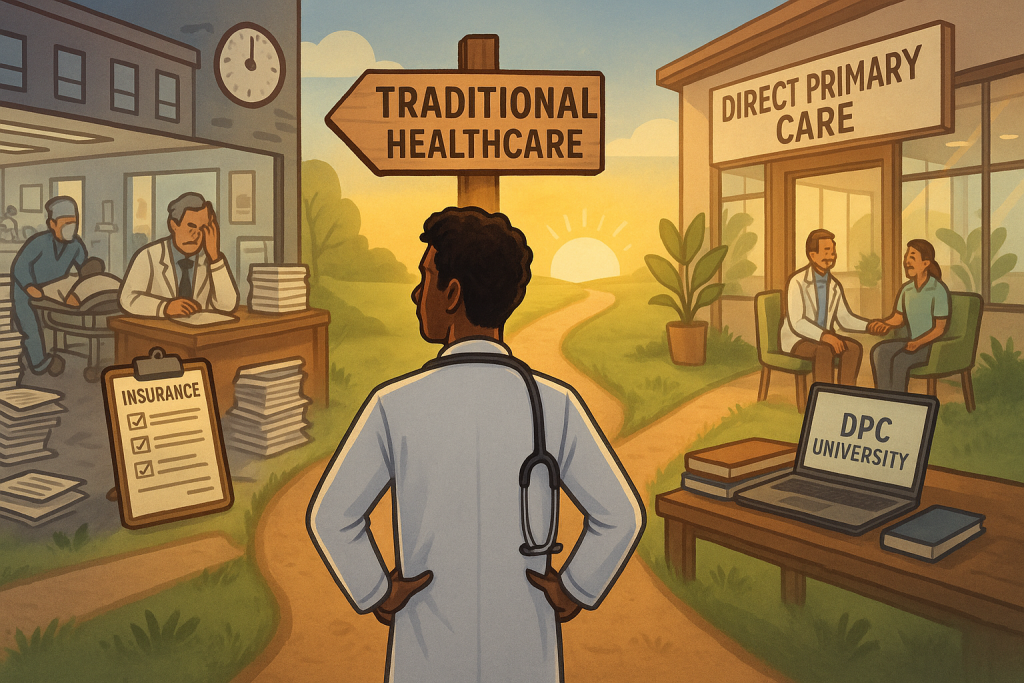You didn’t enter medicine to drown in paperwork. You came to change lives.
You probably envisioned your future self deeply engaged with patients—listening, solving real problems, and building relationships that span years. But as you progress through training, you may already sense a mismatch between that vision and the way healthcare is actually delivered today.
There’s hope. There’s a model that flips the script: Direct Primary Care (DPC).
And if you’re in medical school, now’s the perfect time to explore it.
The System Isn’t Broken—It’s Working Exactly as Designed
Traditional primary care in the U.S. is built around insurance reimbursements, high patient volume, and ever-increasing administrative burden. Most primary care physicians see 20 to 30 patients a day, often with visits lasting 15 minutes or less. Add phone calls, charting, coding, and insurance negotiations—and it’s no wonder burnout rates among primary care doctors are among the highest in medicine.
The Medscape 2024 Physician Burnout and Depression Report and AAFP data both show a troubling reality: primary care doctors are deeply dissatisfied. Despite a passion for patient care, many feel stuck in a system that prioritizes billing over healing.
Dr. Renee Marinelli, in a recent U.S. News article, put it bluntly: “Challenges that are especially prevalent in primary care include overwhelming patient numbers, dealing with insurance, endless paperwork, difficulty finding work-life balance, and lower pay compared to other specialties.”
Direct Primary Care: Patient-First, Paperwork-Free
DPC turns that model on its head.
In a Direct Primary Care practice, patients pay a flat monthly membership fee—usually between $50 and $100—in exchange for access to their physician. No insurance companies. No third-party billing. No CPT codes.
That simple change leads to a radically different day-to-day life for the physician:
- Fewer patients: Most DPC doctors care for 400–600 patients total, not 2,000+.
- More time: They see about 6–10 patients a day, often spending 30–60 minutes per visit.
- Deeper care: More time means better prevention, better chronic disease management, and stronger patient relationships.
- Greater freedom: Without billing codes or insurance red tape, physicians spend their time where it matters—on care, not claims.
According to the 2024 AAFP study cited in the U.S. News article:
- 94% of DPC doctors are satisfied with their career, versus just 57% in traditional practice.
- 98% believe DPC lets them provide better care.
Let that sink in. Almost every DPC doctor believes their patients are better off—and they’re happier too.
But Isn’t DPC Just for Established Docs?
Not anymore.
While DPC was initially pioneered by mid-career physicians frustrated with traditional practice, a new wave of med students and residents are planning for DPC from the start.
Dr. Marinelli recommends that med students interested in DPC:
- Shadow DPC physicians during school.
- Prioritize rotations with private practices.
- Get involved with organizations like the DPC Alliance.
- Attend the annual DPC Summit (discounted for students).
- Explore DPC Frontier to learn the legal and business basics.
These are all great steps. But what if you want a more structured, supported path?
That’s where DPC University comes in.
Enter DPC University: Your Launchpad for Independent Practice
DPC University is FlexPerx’s physician training platform designed to help future DPC doctors go from vision → to plan → to practice.
Whether you’re a first-year med student exploring your options or a resident thinking about launching your own clinic, DPC University meets you where you are and gives you the tools to move forward with confidence.
What You’ll Learn:
- DPC Model Foundations
Understand how the economics, logistics, and care delivery differ from traditional medicine. - Legal Confidence Without the Headache
Learn how to opt out of Medicare (legally), protect yourself under HIPAA, and form a compliant business structure. - How to Build a Launch-Ready Business Plan
From setting pricing to choosing a location, you’ll walk away with a plan you can actually use. - Marketing & Patient Acquisition (Without Selling Out)
Learn how to tell your story and attract patients authentically. - Employer Contracting & Revenue Growth
Go beyond just individuals—learn how to work with small businesses, offer health benefits, and grow your panel. - 90-Day Launch Plan
Step-by-step timelines to help you move from learning to launching.
Bonus: You get access to a national network of DPC mentors, partners, and peers—people who’ve done what you’re about to do and are ready to support your journey.
The FlexPerx Mission: Fixing Healthcare From the Inside Out
FlexPerx isn’t just a platform or curriculum. It’s a movement. We’re building a better healthcare system—one independent practice at a time. That means giving you the knowledge, tools, and community you need to build something sustainable, profitable, and meaningful.
We partner with DPC University instructors, successful clinic founders, the AHD Network, and pioneers like Dr. Brian Forrest to make sure you don’t have to go it alone.
You’re not just buying content. You’re joining a mission.
FAQs from Med Students Considering DPC
Can I launch a DPC clinic right out of residency?
Yes—many physicians do. DPC University walks you through the legal and business steps needed to launch right after training.
What about income stability?
Because DPC is based on recurring monthly memberships, revenue is actually more predictable than fee-for-service models. Plus, your overhead is much lower.
Is it ethical to charge patients a monthly fee?
Absolutely. Most patients pay less than they would in a traditional system—especially with no surprise bills or insurance loopholes. Many DPC doctors also offer discounts, sliding scales, or pro bono care.
How can I learn more before I commit?
Start with a free mentorship call or explore the DPC University curriculum preview. You can also attend a DPC Summit or connect with physicians via FlexPerx’s network.
You Deserve a Career That Fulfills You
The truth is: you don’t have to wait 10 years into practice to start doing medicine differently.
You can build a practice that reflects your values. You can form real, lasting relationships with patients. You can love your job.
And you don’t have to do it alone.
Ready to Explore More?
Start your journey at www.flexperx.com/physicians
Learn more at www.dpcuniversity.com
Join a movement of doctors who are fixing healthcare – by opting out of broken systems and stepping into better ones.



